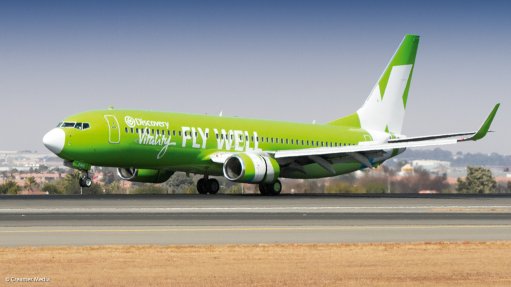
A Boeing 737 of Comair’s low cost Kulula brand
Photo by: Duane Daws/Creamer Media
South African private-sector airline group Comair, operator of the British Airways in South Africa and Kulula low cost carrier brands, announced on Tuesday that it had achieved a record performance for the first half of the current financial year (July 1 to December 31, 2017). Earnings before interest, taxes, depreciation and amortisation (Ebitda) came to R604-million, up from the R575-million achieved in the period January 1 to June 30, 2017.
Profit after tax was R203-million (as against R199-million during the previous semester). Earnings per share and headline earnings per share were 43.6c, as against 42.8c during the preceding six months.
Non-airline revenues rose by 11.6%, while non-airline Ebitda jumped by 20%. As a result, the group’s non-airline businesses now account for 13% of Comair’s profit from operations. These operations comprise flight training, a travel business, catering, and airport lounges.
The company enjoyed strong net cash flows from operations. These came to R514-million, after payments of R135-million on the deep maintenance of aircraft, pre-delivery payments of R160-million for the eight Boeing 737-8 MAX airliners on order, and R75-million for buying a revenue producing property which currently houses the group’s catering operation. Total cash-in-hand, as of December 31, was R777-million.
Comair also benefitted from the strengthening of the rand, because its aircraft loan is denominated in dollars. The exchange rate, which had been R13.73/dollar on December 31, 2016, was R12.36/dollar on December 31, 2017. However, a stronger rand only partially offset the increase in fuel prices. More expensive fuel plus inflation drove up operating expenses by 5%.
“Revenue growth for the domestic aviation industry is reliant on strong economic and GDP [gross domestic product] growth,” pointed out the company in its “Unaudited, unreviewed, condensed consolidated interim results” statement. “Despite the continued surplus capacity in the market restricting occupancy levels to below that of international standards, combined with volatile economic conditions, Comair saw revenue growth of 6% as a result of a similar increase in passenger volumes, while average yields remained flat.”
The company expects the oil price and rand/dollar exchange rates will continue to be volatile over the coming months. However, the delivery of the new and even more fuel efficient 737-8 MAX airliners, scheduled to start next year, will ameliorate this. (Comair owns ten Boeing 737-400s and nine more fuel efficient 737-800s, and leases another seven 737-800s, for a total fleet of 26 single-aisle airliners.)
“Given current volatile economic conditions, it is expected that pressure will be maintained on consumer spending and we therefore foresee continued pressure on margins in the airline industry,” stated the enterprise. “Comair is however well placed to operate in these conditions, with strong brands, committed staff, effective equipment, an efficient cost base and strong cash reserves. Despite mention in the media of a reduction in the flight schedules of some State-owned airlines, it is not anticipated that there will be any reduction in the total capacity operating in the domestic market.”